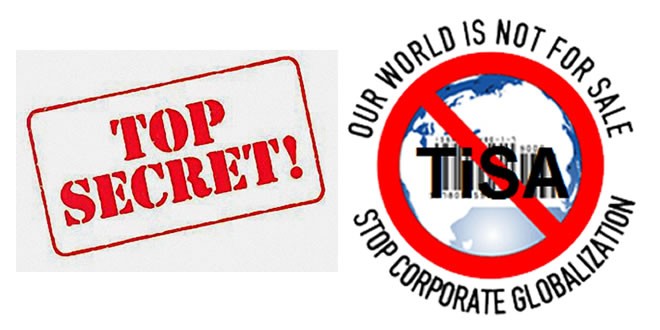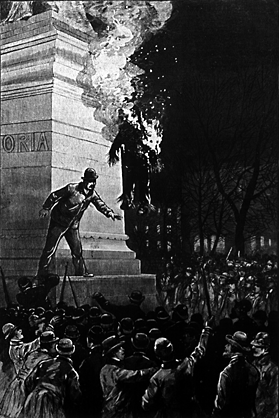TiSA: The Transatlantic Corporatocracy's Last Straw
| Posted by George Freund on December 31, 2016 |

Dec 19, 2016
Trump’s silence on TiSA is deafening.
By Don Quijones, Spain & Mexico, editor at WOLF STREET.
The year 2016 has not been a good one for the international corporatocracy. Its beloved Trans-Pacific Partnership (TPP) is dead and almost buried. The Transatlantic Trade and Investment Partnership (TTIP) is probably also mortally wounded. Meanwhile, the Comprehensive Economic and Trade Agreement (CETA), a Trojan-horse deal between Canada and the EU that could enable as many as 47,000 US corporations to launch lawsuits against European governments that threaten their profit-making capacity, has been signed but still faces big hurdles before being passed into law.
But the battle is far from over. Transatlantic corporations and their armies of trade representatives, lobbyists, think tanks and corporate lawyers have not certainly given up. They still have at least one card up their sleeve. Its name is the Trade in Services Act, or TiSA, and it is the most covert and, according to Wikileaks, “most important of the United States’ strategic ‘trade’ treaty triumvirate,” which also includes the resting-in-peace TPP and the semi-defunct TTIP.
With services accounting for around 75% of the EU economy, 80% of the US economy and the lion’s share of many of the world’s other economies, according to World Bank figures, it’s not hard to see why TiSA is so important.
The agreement involves more countries than TTIP and TPP combined: The United States, all 28 members of the European Union, plus Australia, Canada, Chile, Colombia, Costa Rica, Hong Kong, Iceland, Israel, Japan, Liechtenstein, Mexico, New Zealand, Norway, Pakistan, Panama, Paraguay, Peru, South Korea, Switzerland, Taiwan, and Turkey. Together, these 50 nations form the charmingly named “Really Good Friends of Services” group, which represents almost 70% of all trade in services worldwide.
Like its sister trade deals, TiSA was supposed to have been signed, sealed and delivered by the end of this year. However, disagreements between the US and the EU over the free movement of data have momentarily stalled negotiations. There’s also the wildcard of a Trump government to consider.
“I doubt very much that the Trump administration has thought very much at all about TiSA,” a US trade official told Politico. “When they do think about it, they may look at it as being a different kind of trade agreement, because it’s not dealing with industrial goods. They may see the broad support for it among US stakeholders. They may see the support for it in Congress and see it’s interesting.”
Sounds a lot like wishful thinking, you say. But does it?
After riding a wave of anti-TPP sentiment to the doors of the White House, Trump’s silence on TISA is deafening. In a meeting last week with the CEOs of 13 US tech giants (including Apple, Microsoft, IBM, Cisco, Oracle, and Google), almost all of whom (with the notable exception of PayPal co-founder Peter Thiel) fiercely opposed his election, Trump promised that his administration will make it “a lot easier” for their companies to “trade across borders.”
For giant tech companies, open borders invariably means open digital borders. For the moment, the EU’s trade negotiators are opposed to such an idea, on grounds of data privacy and security — perfectly justifiable given Edward Snowden’s revelations of the scale and scope of US and UK digital surveillance of Europe. But that resistance is likely to crack sooner or later, especially with big data-processing firms threatening to relocate to outside the bloc and industry associations warning that Europe’s foot-dragging could deal a hefty blow to all the other trade deals the EU is negotiating.
Once Brussels caves, the biggest impediment to a consummated TiSA will have been removed. The agreement’s negotiators would have a green light to ban any and all restrictions on cross-border information flows and localization requirements for ICT service providers. As we warned in LEAKED: Secret Negotiations to Let Big Brother Go Global, if TiSA is signed, personal data will be freely bought and sold on the open market place; companies and governments will be able to store it for as long as they desire and use it for just about any purpose.
But that’s not TiSA’s only goal. Thanks to whistle blowing sites like WikiLeaks, the Associated Whistleblowing Press and Filtrala, we now know that this hyper-secret trade agreement, whose contents were supposed to remain concealed from public view for at least five years after being signed, would also “lock in” the privatization of services — even in cases where private service delivery has failed. Meaning governments can never return water, energy, health, education, or other services to public hands. It also seeks to promote “offshoring” of health care services, resulting in rising costs for public health care systems.
In addition, TiSA would restrict signatory governments’ right to regulate stronger standards in the public’s interest, including in the financial services industry, precisely at a time when the global economy is still struggling to recover from a crisis caused largely by financial deregulation. The proposed rules would forbid governments from banning toxic financial products, setting limits on the size of banks, or even entertaining the possibility of breaking up “too big to fail” systemically risky financial institutions.
TiSA would also make it much easier for companies to outsource or offshore jobs across all services industries. The services classification list [DOC] being used in the trade agreement includes 120 subsectors, many of which are professional categories that have heretofore been protected from past trade deals. According to Deborah James of the Washington DC-based Center for Economic and Policy Research, the threat posed by TiSA is particularly daunting given the inexorable shift in employment patterns from high-paying manufacturing jobs to low-wage services jobs, and the potential offshorability of millions more services jobs:
Not only would TiSA promote offshoring of jobs, but it would also greatly expand domestic “inshoring.” Foreign contractors (say from Japan) would be able to bring in workers (say from the Philippines) to conduct work inside a consumer country (say the United States) on terms and conditions well below minimum local pay and local standards. The workers would not even have to be from a TiSA country.
There are plenty of other reasons to fear TiSA. Perhaps worst of all, it would establish a new global enclosure system, one that seeks to impose on all 50 signatory governments a rigid framework of international corporate law designed to exclusively protect the interests of corporations, relieving them of all financial risk, and social and environmental responsibility, while awarding them maximum rights regarding the treatment of labor, capital, inputs, and data. By Don Quijones, Raging Bull-Shit.
The corporatocracy has some powerful friends: central banks. But the ECB’s new role as “debt-buyer of first resort” raises a whole litany of concerns. Read… Here Are the Multinationals whose Bonds the ECB is Discreetly Buying
http://wolfstreet.com/2016/12/19/tisa-transatlantic-corporatocracy-last-straw/

There should be angry mobs in the street over this this one, but people are so dumbed down they can even comprehend this as the complete and total surrender of the nation state and its people to the corporations. We will be nothing more than serfs in our own land. There used to be a way to deal with such treason. I feel that was the major impetus for getting rid of the death penalty. They seem to admire the sick and demented. They just valued their own necks. I've said for years, and my words are recorded that there will come a time as these free trade zones are expanded, we would wipe the frost from the window of the sweat shop to at least be in a warm environment. They will import workers into our own land to take our jobs that we are too foolish to protect never mind the levers of power. And you wonder why they orchestrate mayhem for gun control and the loss of liberty.

No comments:
Post a Comment